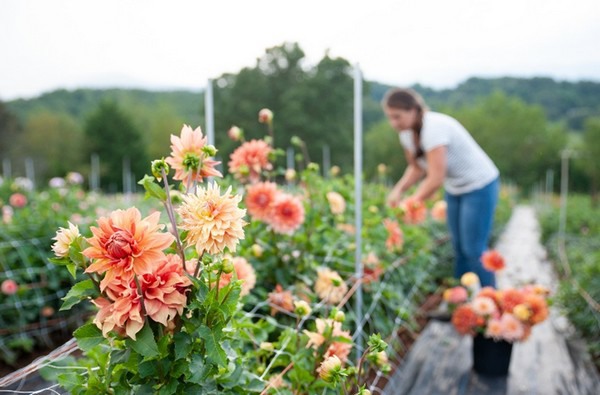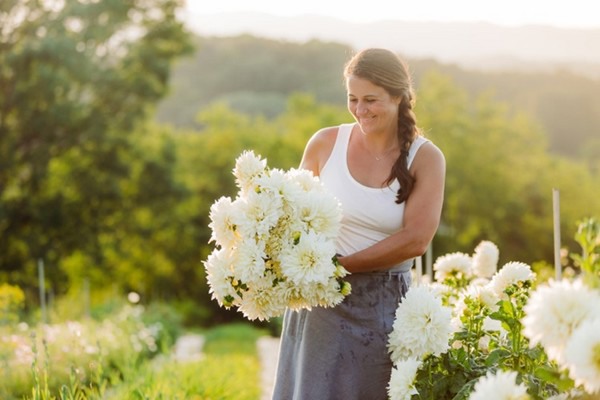“Being small but thoughtful has been a great business model. People assume that you need to be large to be profitable, but you can grow a ton of flowers in a small area,” says Niki Irving, farmer, and florist at Flourish Flower Farm.
Based in the Blue Ridge Mountains of North Carolina, Flourish Flower Farm is in its seventh year of full-time growing. Niki and her family lived in the city and farmed on leased land in the farm's early years. Four years ago, they purchased their own plot atop a large hill, keeping the farm safe from the flooding that often affects the region’s flat areas.
“It is hard to find flat land in the Blue Ridge Mountains. It is either not flat or in a floodplain. Climate change is posing a lot of challenges, but at least for us, flooding isn’t one of them,” explains Niki.
Another benefit of being located on a hill is the microclimate, which allows Niki to overwinter dahlias and have them available as soon as June. With second planting, Flourish Flower Farm offers dahlias from June to October.

Flourish Flower Farm grows three acres of cut flowers and foliage, including multiple perennial trees and shrubs used for cuttings. For the annual and perennial flowers, Niki explains that it is 50/50. Large racks are set up for young plant production in the converted garage, 70% of which is from seed and 30% from plugs.
Acting as caretakers
As Niki explains, Flourish Flower Farm is not certified organic but abides by those principles, viewing themselves as caretakers of the land.
“It is a gift to be the caretaker of this land, so I want to do that to the best of my ability. We have amazing songbird populations and so many pollinators. We use beneficials if we see pest issues, but I don’t want to be around chemicals, nor do I want that for my clients,” says Niki.
The organic ethos seems to be a common theme for small-scale farms, which may not be certified organic but have a clear idea of what it means to be truly organic and protect the environment. For Niki, being organic means leaving the birds to pinch off grasshoppers that chew on dahlia stems. It means supporting nature to do exactly what it did long before the invention of farms.

Workshops for florists, farmers, and anyone who loves flowers
Flourish Flower Farm has a varied product offering that includes cut flowers for florists, wedding designs, and on-farm workshops where people can come experience the farm. With regards to the workshops, the farm offers ten per year which begin in April and end in August, each with a morning and afternoon session and each focusing on a different flower to familiarize attendees with what is in season. The workshops have been a great success, with 2022 sessions having sold out by February.
“These workshops are for people who just love flowers and want to see the farm, as well as aspiring florists and farmers,” says Niki.
Flourish Flower Farms also hosts events specifically for florists and flower farmers, such as the upcoming “Art and Business of Weddings” event in July 2022 and “Flower Farming 101” in the following months.
For more information:
Niki Irving, Farmer and Florist
Flourish Flower Farm
www.flourishflowerfarm.com










